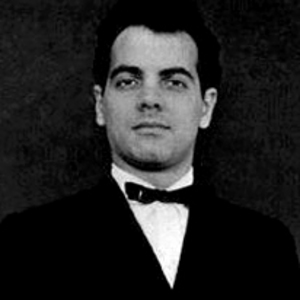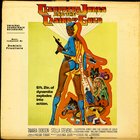Dominic Frontiere

- Genres:
- Classical, Easy Listening, Jazz, Pop/Rock, Stage & Screen
- Meta styles:
- Big Band/Swing, Easy Listening, Film Music, Film Score, Fusion
- Styles:
- Big Band, Instrumental Pop, Smooth Jazz, Soundtracks
Dominic Frontiere (born June 17, 1931) is an American composer, arranger, and jazz accordionist. He is known for composing the theme to the television series The Outer Limits. Born in New Haven, Connecticut, the son of a musical family, at age 7 Frontiere was already playing several instruments before deciding to concentrate on the accordion. At 12, he played solo at Carnegie Hall. After a stint with a big band in the late 1940's and early 1950's, Frontiere moved to Los Angeles, where he enrolled at UCLA.
Born in New Haven, Connecticut, the son of a musical family, at age 7 Frontiere was already playing several instruments before deciding to concentrate on the accordion. At 12, he played solo at Carnegie Hall.
After a stint with a big band in the late 1940's and early 1950's, Frontiere moved to Los Angeles, where he enrolled at UCLA. He eventually became musical director of 20th Century Fox. He scored several films under the tutelage of Alfred and Lionel Newman, while also recording Jazz music.
An association with director and producer Leslie Stevens lead to several projects, most notably composing the theme to The Outer Limits, an innovative blend of music and sound effects. He also scored for The Rat Patrol and The Invaders (the latter, a Quinn Martin Production).
After scoring for TV shows, he went on to compose the music for the Clint Eastwood film Hang 'Em High. The title theme for that movie became a top ten hit for the group Booker T and the MG's.
Frontiere became head of Paramount's music department in the early 1970's, where he again worked on a combination of television and film score, while concurrently orchestrating popular music albums for, among others, Chicago. He won a Golden Globe for the score to the 1980 film The Stunt Man.
Criminal career
In 1986, Frontiere entered a federal penitentiary for nine months of incarceration. Frontiere had scalped tickets to the 1980 Super Bowl, tickets he obtained through his ex-wife, Los Angeles Rams owner Georgia Frontiere. He was estimated to have scalped as many as 16,000 tickets, making a half million dollars in profit that he failed to report to the IRS. Frontiere pleaded guilty and was sentenced to a year and a day in prison, three years probation, and fined $15,000 for failing to report income from the sale of the tickets and for lying to the Internal Revenue Service. (Sports Illustrated, June 30, 1986; New York Times, November 5, December 9 and December 10, 1986)
- Sort by

The Outer Limits CD3
- Year:
- 2012
- Tracks:
- 22
- Bitrate:
- 320 kbps

The Outer Limits CD2
- Year:
- 2012
- Tracks:
- 22
- Bitrate:
- 320 kbps

The Outer Limits CD1
- Year:
- 2012
- Tracks:
- 22
- Bitrate:
- 320 kbps

The Stunt Man
- Year:
- 2008
- Tracks:
- 10
- Bitrate:
- 320 kbps

Washington: Behind Closed Doors (Vinyl)
- Year:
- 1977
- Tracks:
- 10
- Bitrate:
- 320 kbps

Cleopatra Jones Casino Of Gold (Vinyl)
- Year:
- 1973
- Tracks:
- 29
- Bitrate:
- 320 kbps

On Any Sunday (Vinyl)
- Year:
- 1971
- Tracks:
- 12
- Bitrate:
- 160 kbps
 John Gregory
John Gregory  Lalo Schifrin
Lalo Schifrin